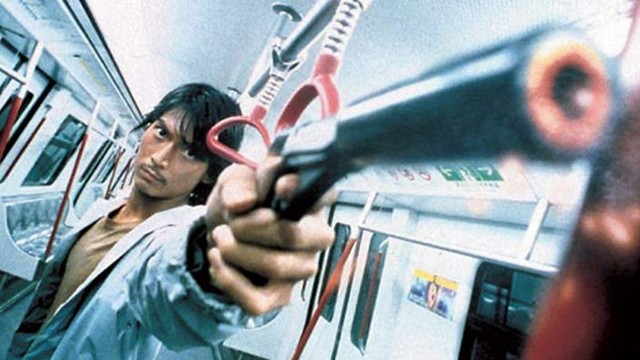
By Jae-Ha Kim
Chicago Sun-Times
December 14, 2001
![]()
Kong is a deaf-mute assassin unable to hear his victims begging for mercy or the cacophonous roar of his gun as he completes his assignments. He quickly and meticulously silences his victims in “Bangkok Dangerous,” a beautiful, gory film in which there are no heroes–just bad guys and not-quite-as-bad guys.
Directed and written by twins Oxide and Danny Pang, the film assaults your senses with its stylized brutality. Set in Bangkok, the picture depicts the squalor of the characters’ lives. There is no beauty in this Bangkok–just dank despair.
Kong is used to living in isolation. His childhood was one of survival. Neighborhood children taunted him with cruel words and flying fists. Rather than showing compassion for the little boy, they pelted him with rocks. Lying on the road bleeding, clutching his little bag of groceries, he unleashes an animal-like cry that pierces the viewer’s heart.
Flash forward to modern-day Thailand. Kong’s baby face now has the gaunt, handsome look of a starving musician. But his eyes–sad and filled with despair–retain childlike wonder.
At a shooting range, where he has taken over his mother’s janitorial job, he is befriended by Joe and his girlfriend, Aom. Joe is a hitman and sees potential in Kong, who has perfect aim. Best of all, he is a silent partner grateful for the couple’s companionship. Joe teaches Kong how to kill and to live by the motto, “An eye for an eye.” When Joe’s hand is shot in a botched job, he is forced to rely on Kong for support.
The three lead actors are supreme in their roles. As Kong, Pawalit Mongkolpisit projects vulnerability, even as he executes cold-blooded murder. Pisek Intrakanchit is confident, cocky and (at times) pathetic as Joe. And Patharawarin Timkul is wonderful as Aom, the tough-talking go-between whose no-nonsense demeanor is the catalyst for the trio’s demise.
They know their world is dangerous, but it’s the only reality they know. As Aom says, “It just feels like we might not see each other tomorrow,” so she memorizes everything about Kong every time she sends him out on an assignment.
The Pangs provide no morality lesson in their picture. Kong’s brutal childhood isn’t used as an excuse for his chosen profession and they don’t justify the trio’s actions by villainizing the victims, either. Some are innocent and no one really cares. Until the end.
The violence takes a breather with the introduction of Fon (Premsinee Ratanasopha), a beautiful, sweet pharmacist who lives with her grandmother. Unshaken by Kong’s disability, but unaware of his job–she thinks he is a gas station attendant–Fon invites him home for dinner. Her grandmother absentmindedly notes, “Your friend is very polite. He doesn’t talk too much.”
Kong takes Fon to a fair where he impresses her with his unfailing aim at a shooting gallery. Fon then treats him to a Charlie Chaplin silent film. He immerses himself in the movie where, for once, he is not at a disadvantage.
The filmmakers assault our senses with a frenetic soundtrack and gorgeous slo-mo dissolves with music video-perfect edits, but this isn’t an easy film to watch. The violence is graphic and there is little break from the action. But the acting and the photography make it a worthwhile trip to a place we hope doesn’t actually exist.